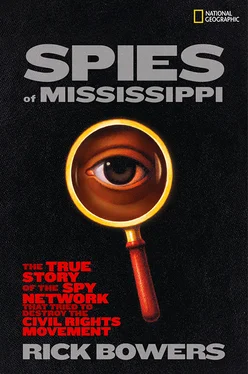Humes followed up the initial assignments with such detailed information and enticing leads that his handlers steadily upped his pay. Before long, the minister was receiving a $150 monthly salary and additional payments for special assignments. The 55-year-old preacher became the primary source of anti–civil rights intelligence in the Delta. He provided advance word on NAACP meetings, warnings of visits from out-of-state leaders, whispers of future actions, and the names and addresses of new members and aspiring leaders. Humes was so thorough that he even hired a stenographer to record NAACP meetings word for word. He mailed meticulous reports to the Commission office and frequently drove to Jackson to brief his handlers in person.
Then, in July 1957, everything changed. Greene and Humes were exposed. The Associated Press broke a story stating that two black leaders were pocketing under-the-table payments from a public agency dedicated to preserving segregation. The proof: state-issued checks made out to Greene and Humes from the Sovereignty Commission.
The civil rights community was outraged by the betrayal. NAACP leaders complained that their work to secure equal rights for ordinary people had been jeopardized by a couple of well-heeled Uncle Toms. Grassroots activists grumbled that they were going to jail for the cause while well-to-do community members were on the payroll of the jailers. The leadership of the NAACP fired back at the informants. NAACP executive director Roy Wilkins told a packed crowd of 600 people at the Mount Bethel Baptist Church in Gulfport that Greene and Humes were “quick to get their hands in the till.”
Speaking from the pulpit of the same church in Gulfport, Humes denied the allegations. Addressing hundreds of people packed into the pews, he charged that the NAACP had “fallen into bad hands.” But Humes’s supporters were slow to rally to his defense, and his enemies were quick on the attack. NAACP members circulated a petition calling for his removal as president of the Baptist Convention. A coalition of black preachers issued a statement calling him “unworthy of the fellowship of the ministers of the Protestant denominations in Mississippi.”
Deflated by the attacks and fearful of being exposed again by reporters, Humes cut back on his spying and stopped traveling to Jackson to file reports. Instead he met his handlers at secret locations to plead for their support in clearing his name. He became consumed by the vendetta against him and depressed about his fall from grace.
Then, one night while driving home from a friend’s house, Humes started to feel sick. Concerned that his condition was worsening, he made his way to a segregated medical clinic to be examined. While waiting to be tended to, the minister went into a seizure, suffered a heart attack, and died. The next day Humes’s Commission contact sent a memo to Governor Coleman. It read, “The death of Rev. Humes has cost us one of the most influential Negroes we have had working on our behalf.” Later, the agent drove to the minister’s house in Greenville and, unbeknownst to the grieving family, slipped into Humes’s office “to remove all files dealing with the Sovereignty Commission.”
The exposure of the black informants lifted a curtain on the state’s secret spy network. Now, NAACP leaders were keenly aware of the dangers posed by those curious men in suits who had been jotting down the tag numbers of cars parked outside their meeting places. Civil rights activists began taking steps to protect their confidential documents and calling out suspected snitches in their meetings. For its part, the Commission quickly replaced Humes with one of his followers and added more informants—white and black—to its intelligence pipelines. As for Greene, he weathered the storm and continued informing and publishing propaganda. The two sides were poised for conflict, and there was more controversy bubbling up from the rich, black Mississippi River Delta.
The Mississippi River Delta is a study in contrast.The vast stretches of green and white cotton fields are interspersed with eerie, moss-draped cypress swamps. The white-pillared mansions of the plantation elite stand near the huts of the poor dirt farmer. The Delta is home to debutante balls and backroom gambling dens, ramshackle houseboats and majestic paddle wheelers. This sweltering, insect-ridden, and amazingly fertile stretch of bottomland forms, in the words of author James C. Cobb, “the most Southern place on earth.”
Back in the 1860s, hundreds of thousands of slaves worked the vast cotton fields. They were afraid to resist or to run for fear of being whipped, beaten, or sold away from their families. Each day, more black men, women, and children were delivered to the plantations by slave brokers, who purchased their human cargo in the bustling markets of New Orleans and Natchez and marched them in groups of about 30 for hundreds of miles to their oppressive new homes. The seemingly endless supply of slave labor and a ravenous demand for cotton fueled a robust economy dominated by wealthy planters, powerful politicians, and influential businessmen.
The legacy of slavery, the grip of poverty, and widespread illiteracy made it virtually impossible for civil rights workers to organize effectively in the Delta prior to the 1950s. The small cotton-processing towns and thinly populated enclaves seemed destined to be racially segregated and brutally oppressive for African Americans for generations to come. But by the late 1950s, in the hardscrabble river town of Clarksdale, change was in the air. Aaron Henry, president of the Coahoma County Chapter of the NAACP and executive secretary of the Regional Council of Negro Leadership, was organizing the black community. The mild-mannered activist was petitioning the local school board to integrate schools, urging the sheriff to crack down on the harassment of black voters, and demanding that newspaper editors refer to black people in their columns with the courtesy titles of Mr., Mrs., and Miss.
Henry, a registered pharmacist and owner of the Fourth Street Drug Store, had turned his pharmacy into a makeshift community center and citizenship school, where he prepared poor sharecroppers, shopkeepers, and household servants to vote for the first time. Affectionately known in the community as Doc, Henry had a unique ability to work across the racial divide and a talent for forming unlikely alliances.
Henry had grown up in a sharecropping family on the Flowers Brothers Plantation outside Clarksdale. He escaped poverty by joining the army and learned his pharmacy craft at Xavier College in New Orleans. After college, drawn by the lure of the land and a determination to end racial prejudice, he returned home to the Delta. “You know that old Mississippi River has never had an ounce of racial prejudice,” he liked to say. “When it comes to bursting over those levees, it doesn’t stop to ask where the colored section is. It just takes all.”
The Commission spies initially underestimated Henry’s effectiveness. They bragged of duping him into divulging valuable information without even knowing it. But over time, Henry’s relentless organizing and alliance building forced the spies to enhance their surveillance. In early 1958, Commission agent Zach Van Landingham traveled to Clarksdale to meet three men—a judge, a candidate for sheriff, and a leader of the Clarksdale chapter of the White Citizens’ Council. The prominent local leaders told the agent that the pharmacist-turned-organizer was stirring up needless trouble in the black community and laid out a plan to rid themselves of the agitator.
The Council would pressure wholesalers to stop selling supplies to Henry’s drugstore and would press doctors to refuse to write prescriptions for patients who shopped there. The economic squeeze would bankrupt Henry and force him to leave town in search of work. The Council also planned to persuade the superintendent of the Coahoma Country Negro School District to fire Henry’s wife, Nicole, from her teaching job just to make sure the couple had no reason to stay in town. “It is believed that if Henry leaves the area,” Van Landingham reported to his superiors at the Commission, “the NAACP will die.”
Читать дальше












